Search engine optimization (SEO) is the practice of enhancing your website to make it more visible in search engine results, driving more visitors to your site.

In this article, we’ll explore nine key benefits of SEO and how it can positively impact your website and business success.
Table of Contents
1. SEO Increases Your Website’s Visibility
SEO is one of the most effective ways to attract visitors to your website, often becoming a primary source of traffic for businesses.
For instance, the AI startup Flowrite saw a significant boost in organic search traffic after consistently applying SEO best practices. These included thorough keyword research targeting their audience’s pain points over two years. This example highlights how strategic SEO can yield impressive results.
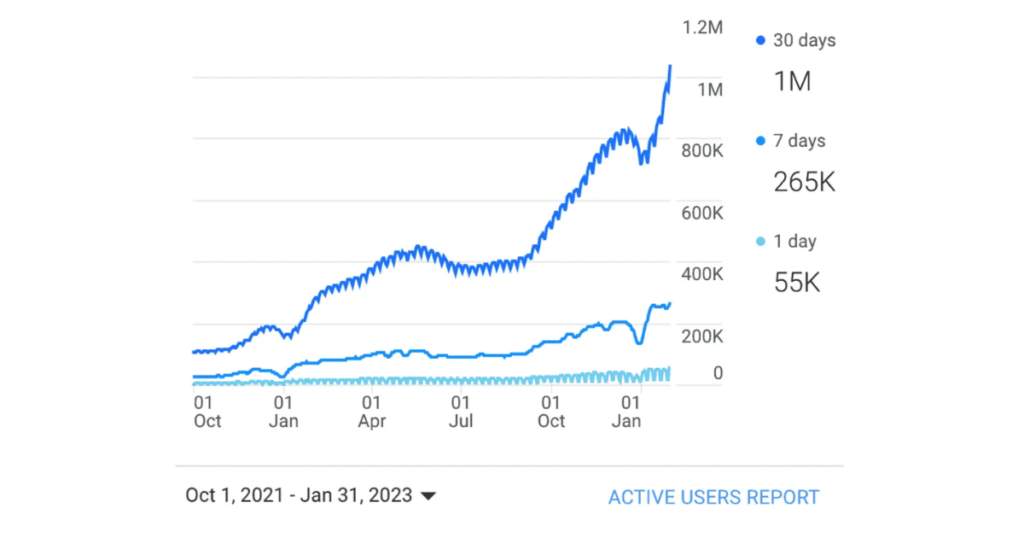
Flowrite experienced remarkable growth, increasing its monthly website visitors from under 100,000 to over 1 million by implementing an effective SEO strategy.
Here’s how SEO helps connect your audience to your website:
When people use search engines, they enter specific keywords (called search terms) to find solutions or answers to their queries.
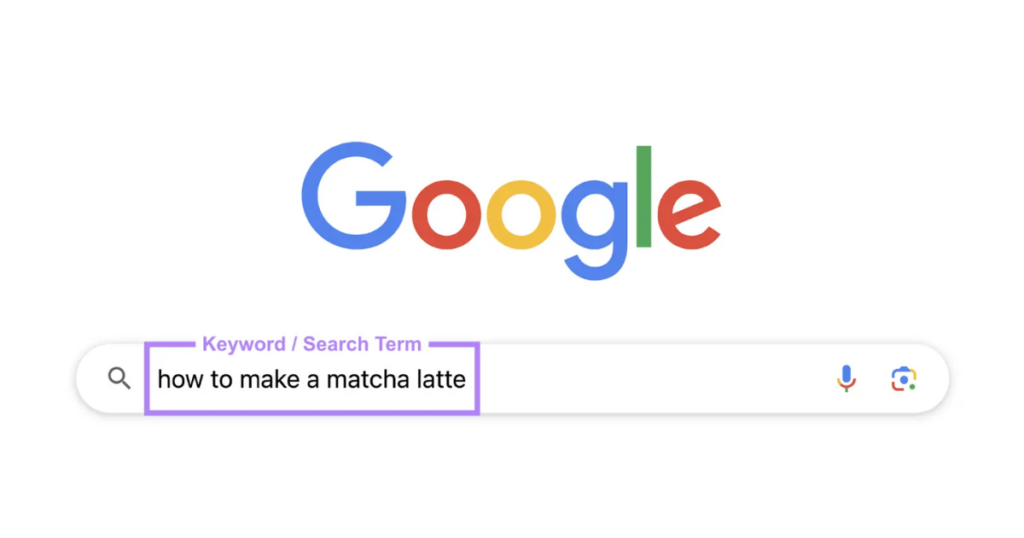
Then, websites related to the user’s query will appear on the search engine results page (SERP).
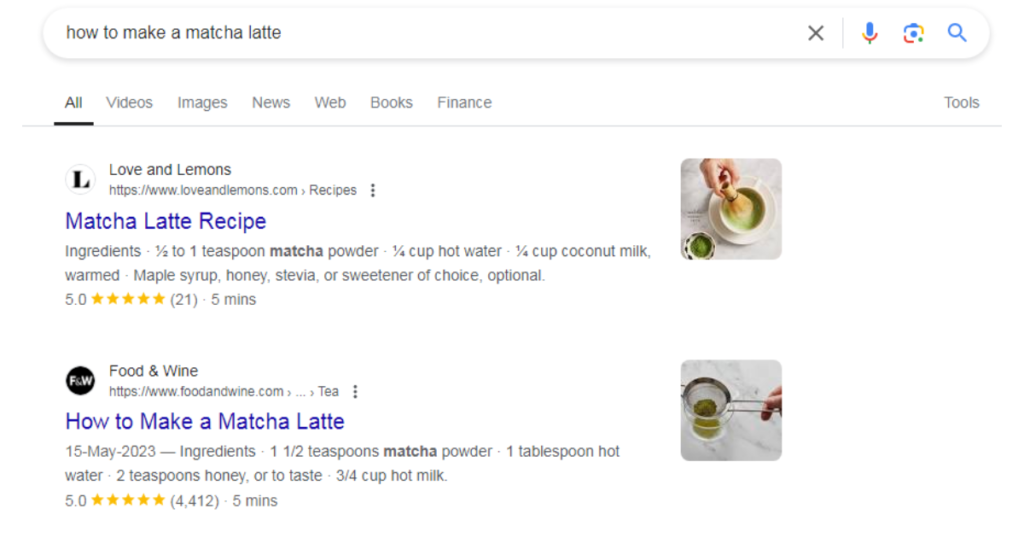
Website owners optimize their blog posts, articles, and webpages to rank higher in search engine results, which increases clicks and drives more traffic.
According to a study by Backlinko, the top organic result (unpaid listing in search results) is 10 times more likely to be clicked than the content ranking in the 10th position.
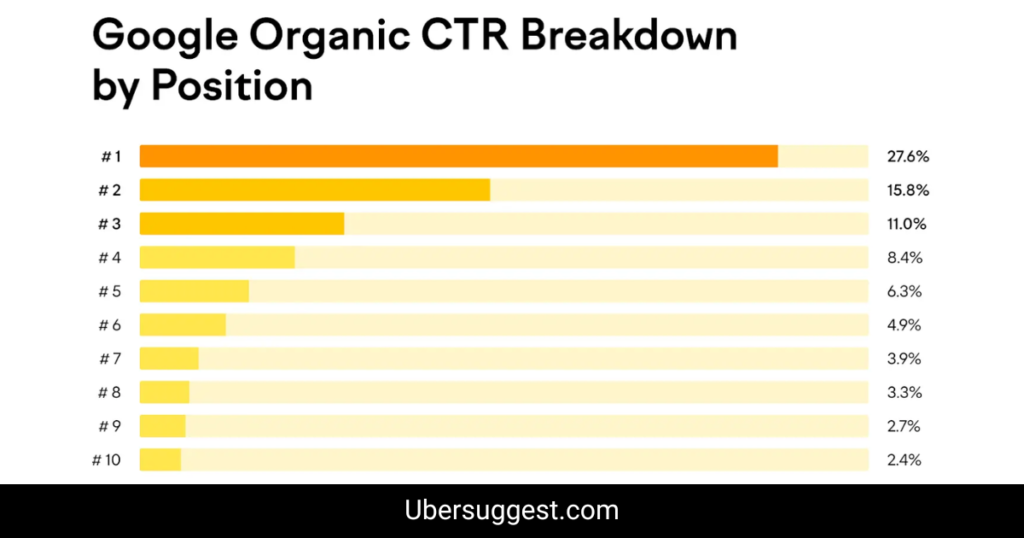
More clicks translate to more visitors landing on your website, which ultimately means increased web traffic.
Organic search results are different from paid listings, which appear as ads marked with a “Sponsored” label.
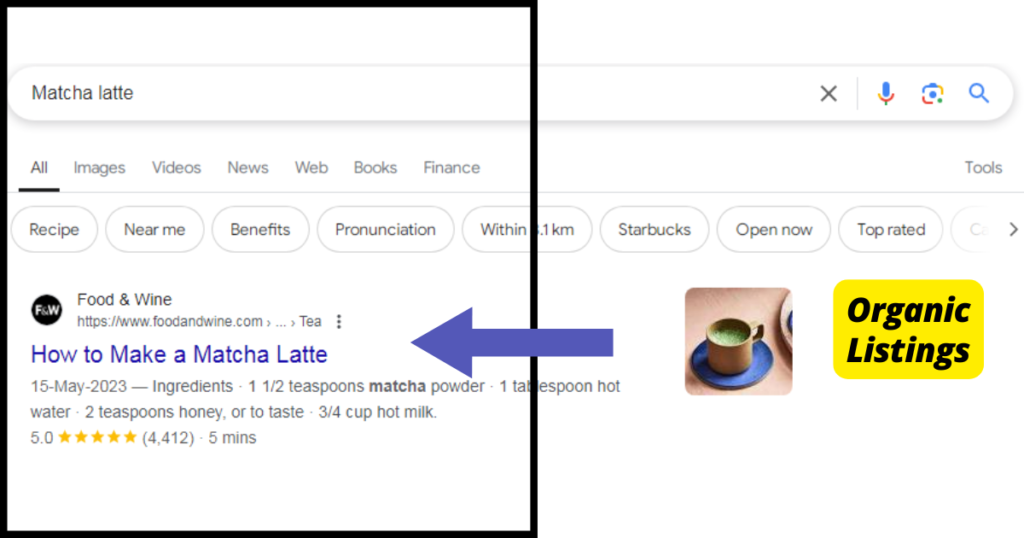

Traffic generated from ads is referred to as paid traffic, while organic traffic comes from users clicking on unpaid search results.
SEO is essential for improving your ranking in organic search, which is crucial since organic search drives 62% of all web traffic, according to research by Marketing Insider Group.
This is more traffic than all other sources combined, including email, social media, paid ads, referrals, and direct visits.
By focusing on SEO, you’re tapping into the largest potential traffic source, drawing as many visitors as possible to your site.
SEO also helps search engines like Google understand the purpose of your site and individual pages. The goal is to show that your content can answer users’ questions and satisfy their search intent—the reason behind their queries—by offering high-quality, relevant information.
For example, imagine someone searches for “best bars in Venice Beach.”
If your travel website features a guide titled “10 Best Bars in Venice Beach for 2023,” complete with relevant keywords, updated details, high-quality images, and precise directions, it’s well-positioned to rank.
Since your content aligns with the search intent and provides value to readers, Google may boost it higher in the search results over time. As a result, more people will discover and click on your page.
Why is this important?
Because it increases your website traffic, giving you more opportunities to convert visitors into customers and drive sales.
Further reading: SEO Traffic: What It Is and Why You Need It
2. SEO Is a Cost-Effective Way to Grow Your Business
One of the greatest advantages of search engine optimization is that it’s technically free, as long as you’re not paying for outsourced SEO services or content creation.
There are plenty of free resources and tools available to help you optimize your website and content.
For instance, with Ubersuggest, you can search up to three keywords per day for free using its Keyword Suggestions tool, making it easier to improve your content and target the right audience.
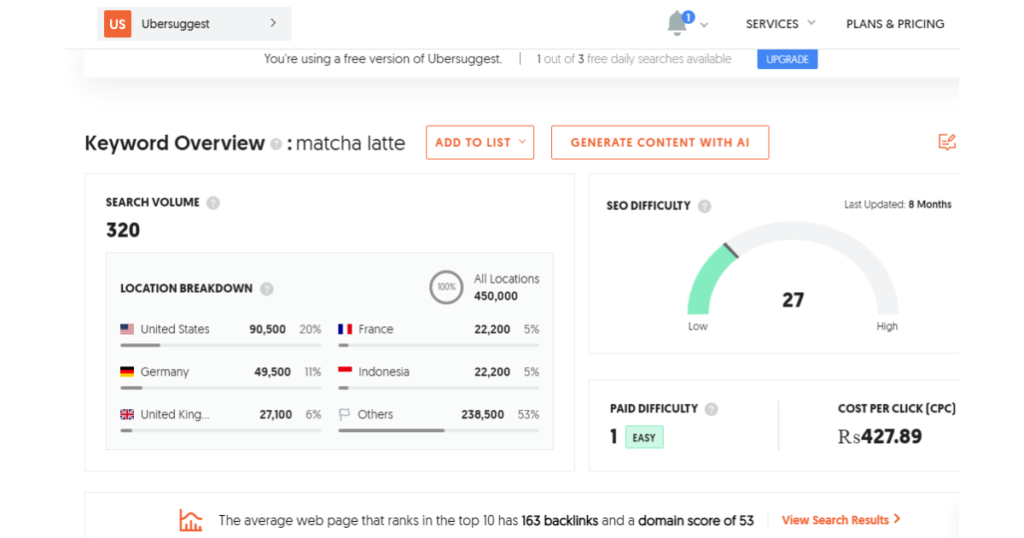
You can also take advantage of Google Trends, a free tool that helps you discover trending topics across different countries worldwide.
Both Ubersuggest and Google Trends provide valuable, data-driven insights to help you create blog posts, articles, web copy, and other content that effectively addresses your audience’s needs.
The affordability of SEO makes it an attractive alternative to paid advertising, particularly if you’re working with a limited budget.
In contrast, running an ad campaign involves multiple expenses, such as content creation, landing page design, and testing—all before even covering the cost of ad placement.
According to Fit Small Business, here are the average costs of running various ads, from Google to social media:
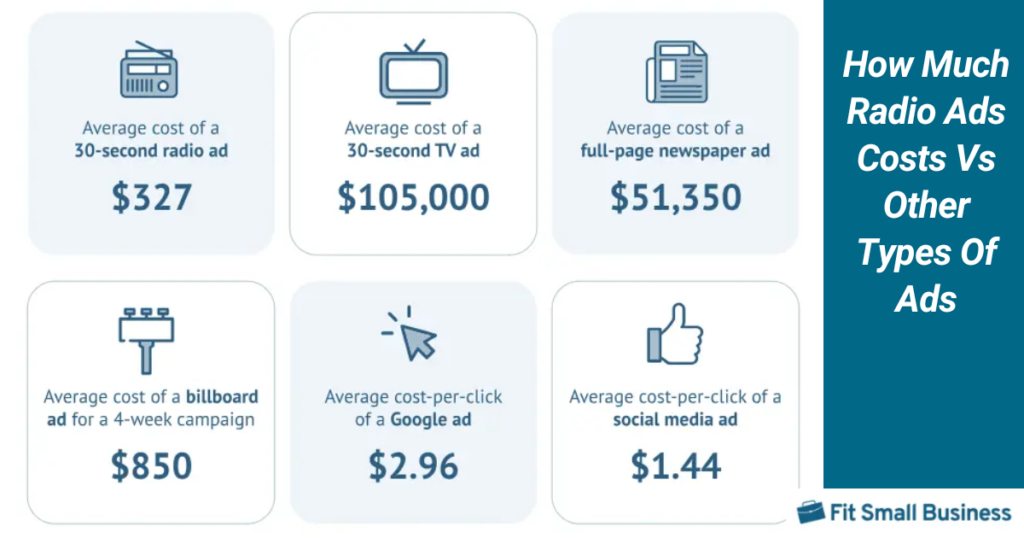
Image Source: Fit Small Business
As you can see, running ads can become expensive very quickly.
Additionally, if paid traffic is your primary (or only) source of visitors, stopping your ad campaigns can lead to a significant drop in website traffic.
This doesn’t mean advertising isn’t valuable. Ideally, paid ads should work alongside your organic traffic efforts, enhancing your overall SEO strategy.
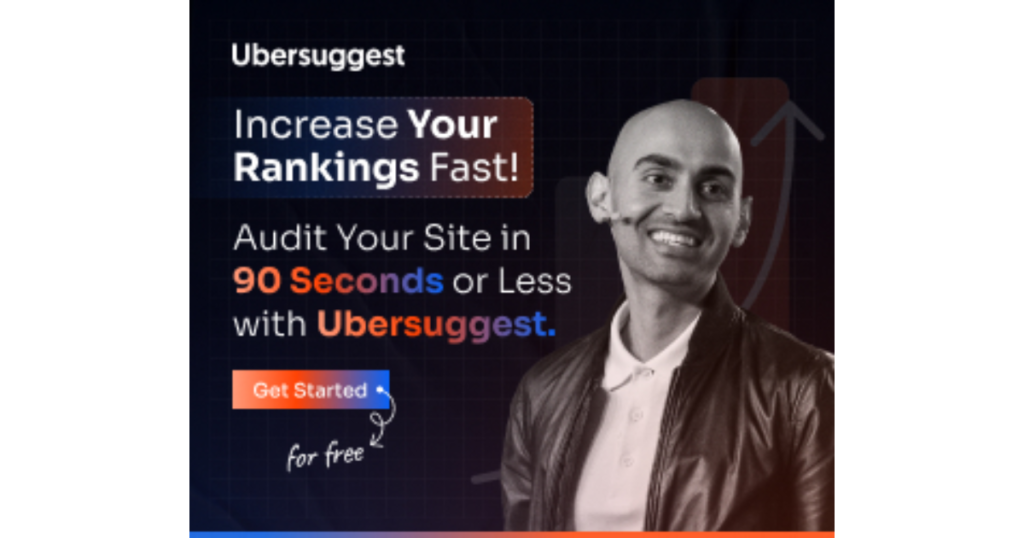
3. SEO Enhances Brand Awareness
A solid SEO strategy, where your business appears frequently in search results, helps establish your brand as a trusted authority.
Why is this important?
It signals to potential customers that your business is credible and worth considering for their purchases.
For example, imagine you want to create a new website to sell products, but you’re unsure where to start. You search for “How to build a website” on Google.
One of the top results might be a comprehensive guide from the website builder platform Wix, like the one below:
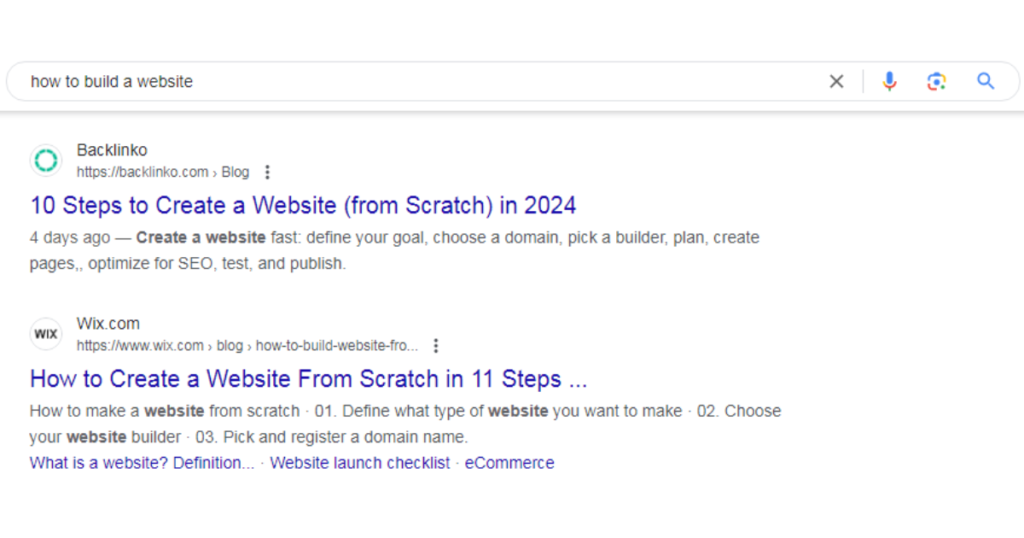
Now, you’re familiar with Wix.
Even better?
The guide provides valuable, high-quality information and practical advice, which has created a positive impression of the brand in your mind.
Next, you decide to research website builder options, so you search for “best website builder for small business.”
In the search results, you find Wix listed as a top choice.
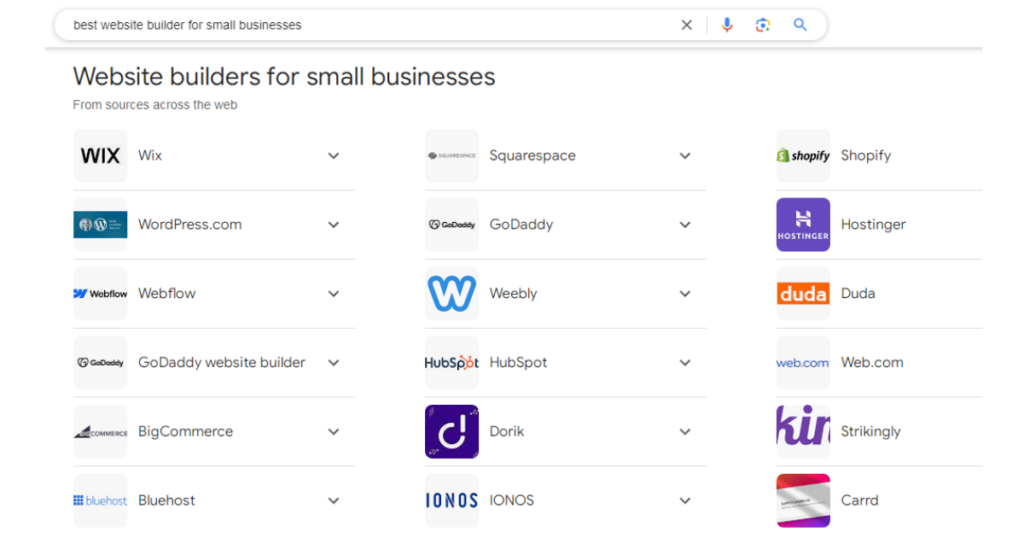
Wix is on the first page of Google’s search results again When you search for “creating a website store,”
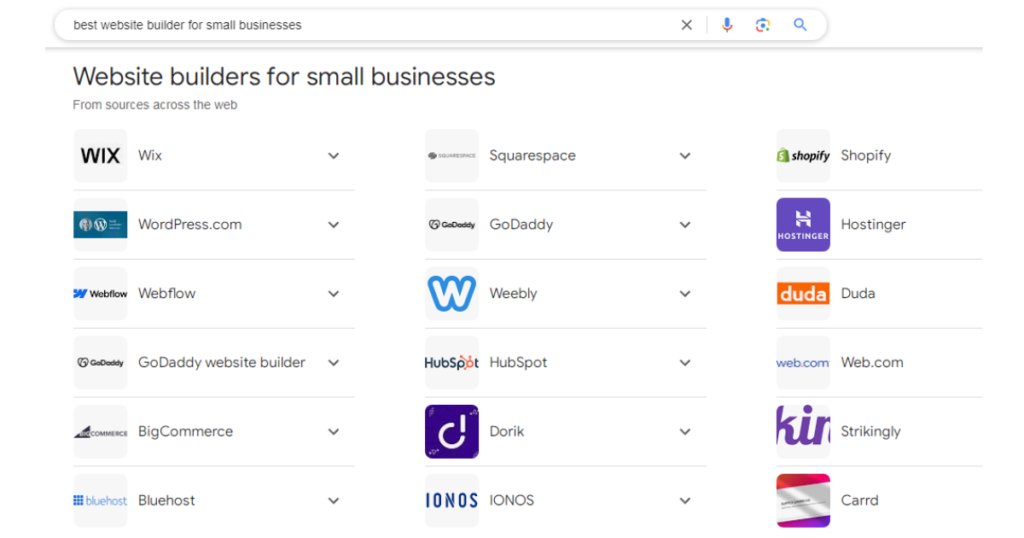
By appearing in multiple search results, Wix positions itself as an industry leader and strengthens its credibility.
Wix’s SEO strategy focuses on optimizing its site by targeting specific keywords and creating valuable content around relevant search queries.
Consistently following this approach helps Wix build topical authority, making it easier for both search engines and users to trust the site on those subjects.
At the same time, Wix increases brand awareness through SEO, making it more likely that users will choose them over lesser-known competitors.
The more frequently you appear in search results, the more you can benefit from SEO, including gaining trust, credibility, and brand recognition.
You can build brand awareness over time through:
- On-page optimization
- Technical SEO
- A consistent brand message
- User-friendly web design and structure
Google also values “helpful, reliable, people-first content.”
To provide the most relevant results to users, Google evaluates content based on its E-E-A-T guidelines: Experience, Expertise, Authoritativeness, and Trustworthiness.
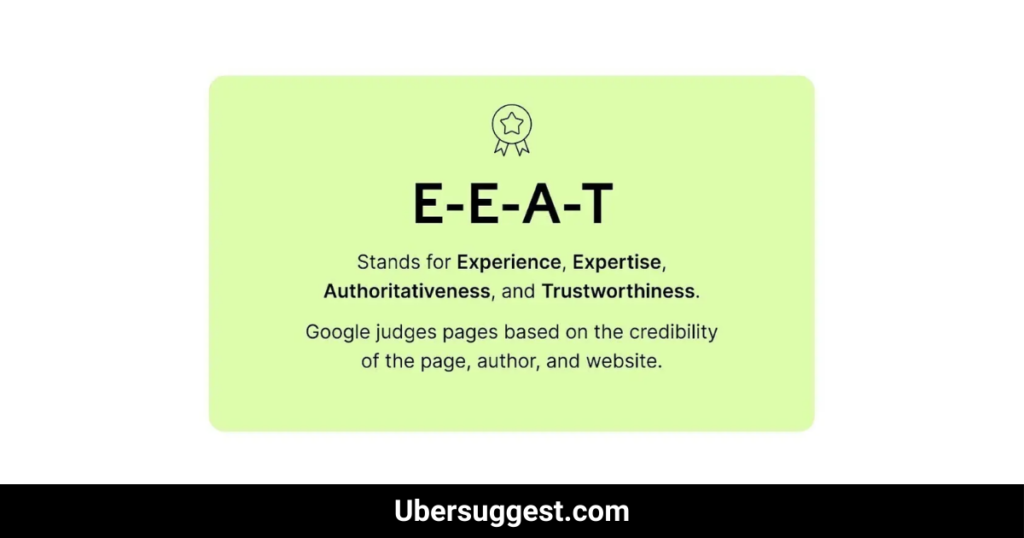
Although E-E-A-T isn’t a direct ranking factor, publishing high-quality content created by writers with firsthand experience and a solid industry background can enhance your site’s credibility.
By prioritizing E-A-A-T (Experience, Authoritativeness, and Trustworthiness) in your SEO strategy, you can improve your chances of ranking higher in search results.
4. SEO Helps You Understand Your Customers
Search engines aim to provide the most relevant results to users. By analyzing SEO data and insights, you can learn what your customers want and need, allowing you to meet their expectations and improve your rankings in the search results.
For example, Google offers free tools to help you understand user activity and behavior, enabling you to create better experiences. These tools include Google Analytics, Google Search Console, and Google Trends.
With these three tools, you can discover:
- How visitors find your website
- Where people enter and exit your website
- How long do users stay on a page
- The number of visitors who leave your site quickly
- Your most popular pages
- Which pages Google has indexed (and which it hasn’t)
- The frequency with which people search for specific terms
- Trending topics
- Seasonal trends (e.g., keywords related to holidays) that impact your business
By researching this data, you’ll identify what works and what doesn’t. You can then use these insights to continuously improve your SEO strategy.
For example, with a GA4 account, you can access a range of insights, from revenue to users per minute, to help refine your efforts.
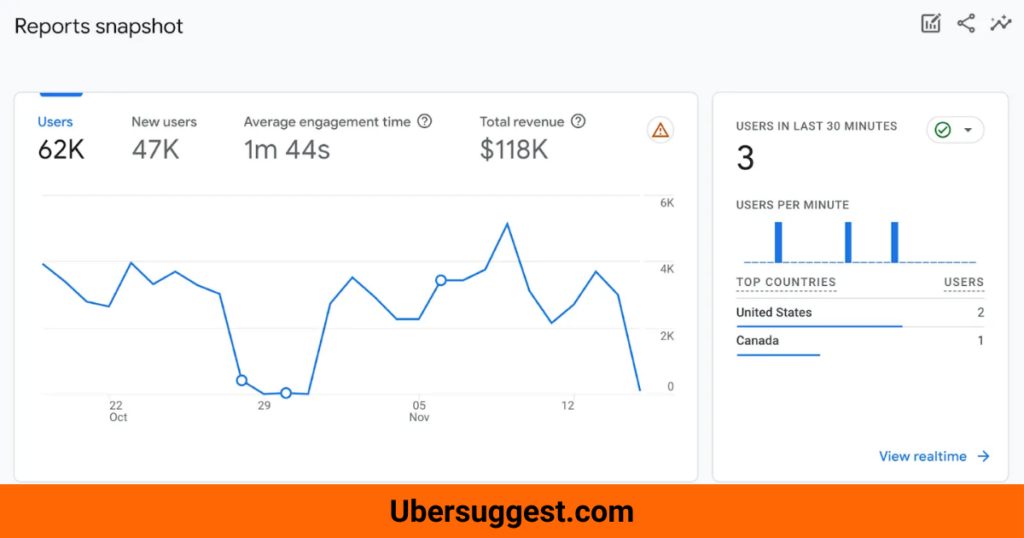
Another way to better understand your audience is by researching search intent.
Ubersuggest’s Keyword Overview can help you uncover the search intent behind any keyword. Essentially, it shows you what users aim to achieve when they enter a query into a search engine.
Here’s how to use Keyword Overview:
- Go to Ubersuggest and open the Keyword Overview tool.
- Enter a keyword and click “Search.”
You’ll find the search intent displayed on the far right of the “Overview” tab.
For example, if the intent is informational, it means the user is looking to learn more about a topic.
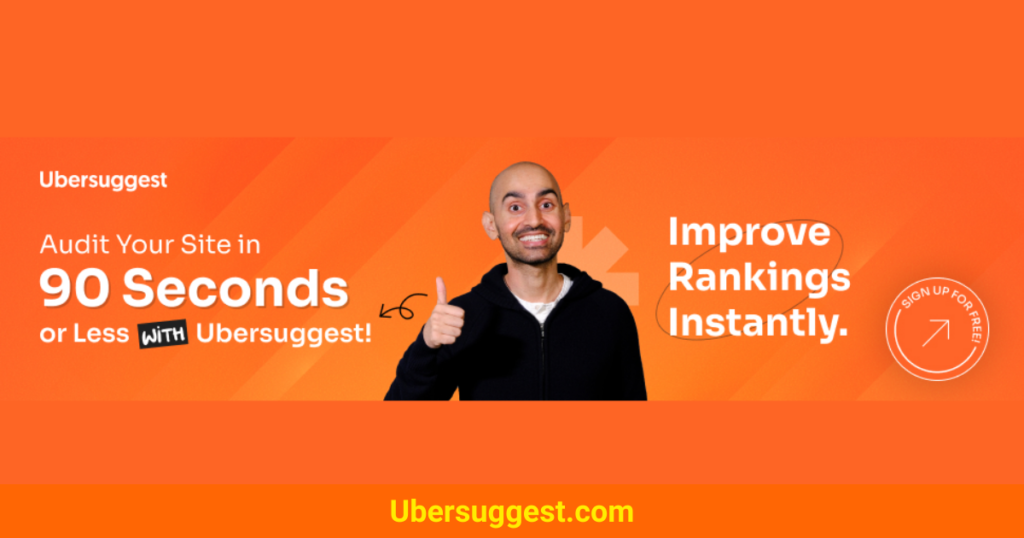
There are four main types of search intent:
- Informational: The user is seeking knowledge or information about a topic.
- Navigational: The user is looking for a specific website or webpage.
- Commercial: The user is researching products or services before making a decision.
- Transactional: The user intends to take a specific action, such as making a purchase or signing up for a service.
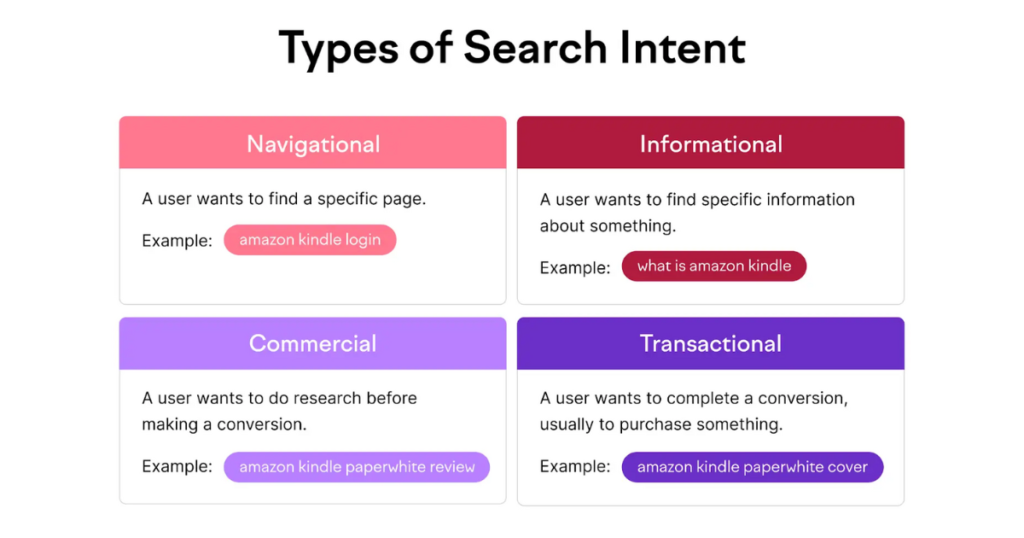
If you understand search intent, you can use keywords and create content that meets your customers’ needs. And potentially rank higher in search results.
5. SEO Enhances User Experience
User experience (UX) refers to the overall experience visitors have when interacting with your website. One major benefit of SEO is its ability to improve UX, which can lead to higher conversion rates.
A poor user experience results in visitors spending little time on your site or leaving right away. This signals to Google that your site isn’t meeting users’ needs.
On the other hand, if users easily find what they’re looking for and stay on your pages longer, it indicates a positive experience. This tells Google that your site is providing value to its visitors.
Google’s algorithm prioritizes:
- Pages that are user-friendly and easy to navigate
- Fast page load speeds
- Websites secured with HTTPS
- Mobile-friendly design
- Internal links that connect relevant pages
- Accessibility features
Websites that incorporate these elements make it easier for Google to crawl, understand, and index their pages accurately.
Additionally, these features help users find what they need, which can boost leads and sales.
UX and SEO are closely connected. To deliver an excellent user experience, implement SEO best practices like ensuring mobile responsiveness and optimizing load times.
Further reading: 10 UX Design Examples to Get Inspired in 2023
6. Effective SEO Aligns with Good PR
Digital PR (public relations) focuses on crafting valuable content that journalists are eager to reference and link to.
Similarly, a key element of SEO is producing content that attracts links and serves as a credible resource for others.
Take, for instance, our State of Search 2023 report. It’s an example of a “linkable asset”—a piece of content designed to naturally earn backlinks. This report draws on data from our suite of tools to analyze search traffic trends across the U.S. over the past year.
The report covers insights like:
- Search traffic segmented by industry or market.
- The proportion of newly ranking domains.
- Average click-through rates (CTR).
By merging data-driven insights with well-crafted content, both PR and SEO achieve their shared goal: generating visibility and trust.
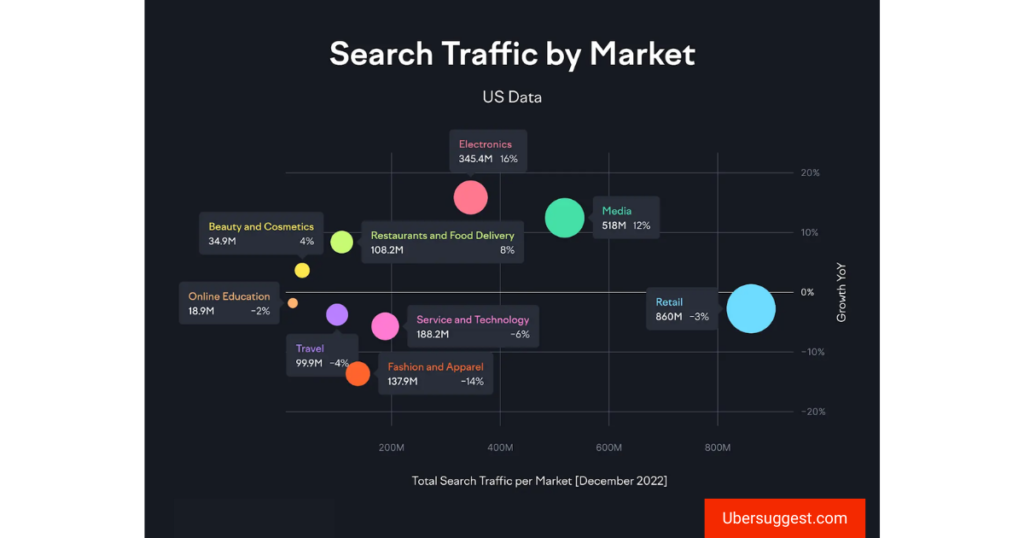
“The State of Search” is a valuable resource for journalists and bloggers covering the SEO landscape. It’s based on original research and includes linkable assets like thought leadership content, guides, tools, and infographics. As of November 2023, Ubersuggest’s Backlink Analysis shows the page has a strong backlink profile with 177 referring domains and 7.7K backlinks.
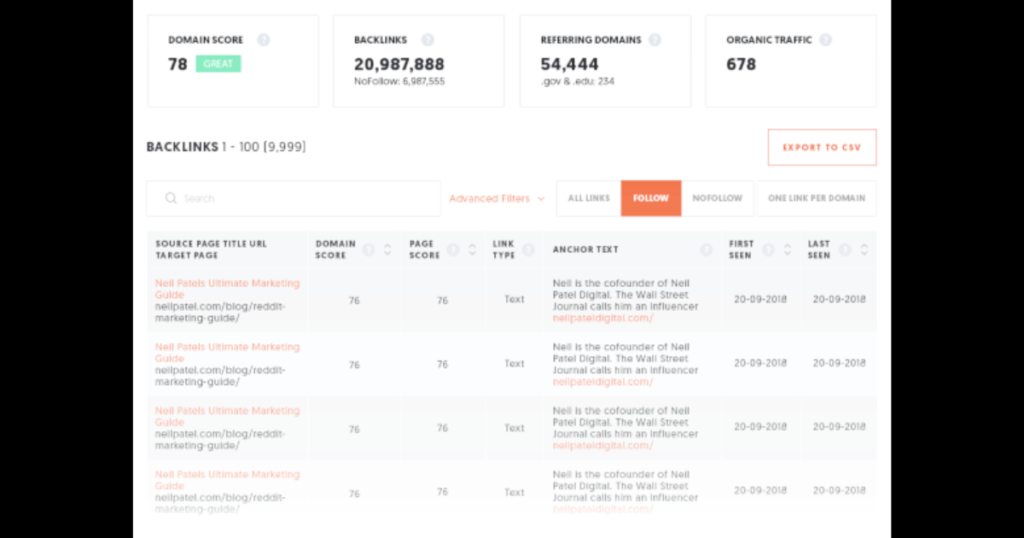
Pro Tips:
Paste a link into Ubersuggest’s Backlink Analytics tool to see the number of domains linking to you and view their Authority Score.
Backlinks are like votes that help websites rank higher in search results. Search engines, like Google, see backlinks from other websites as a sign that your content is important and trustworthy. The more votes (backlinks) you have from reliable sources, the better your website will rank.
For example, the State of Search report has a backlink from a well-known website called Social Media Today. This shows that other experts in the field recognize the value of the report.
Social Media Today is a very reliable website. Ubersuggest measures the quality of websites on a scale of 0 to 100, and Social Media Today scores a high 75.
Getting a link from such a reputable website boosts Ubersuggest’s credibility and trustworthiness.
Similarly, links from other trusted industry websites can increase your visibility and reputation. When a major publication mentions your content, it introduces your brand to a wider audience and establishes your credibility.
This is also beneficial for public relations.
7. SEO Helps Local Businesses Get Found
Even if you have a physical store or serve a specific area, SEO can help you reach local customers. Local SEO is a strategy that helps your business appear in search results for local searches like “best pizza near me” or “plumber in Los Angeles.”
Following local SEO best practices can increase your visibility and attract more local customers. Here’s an example of what a local search result looks like on Google:
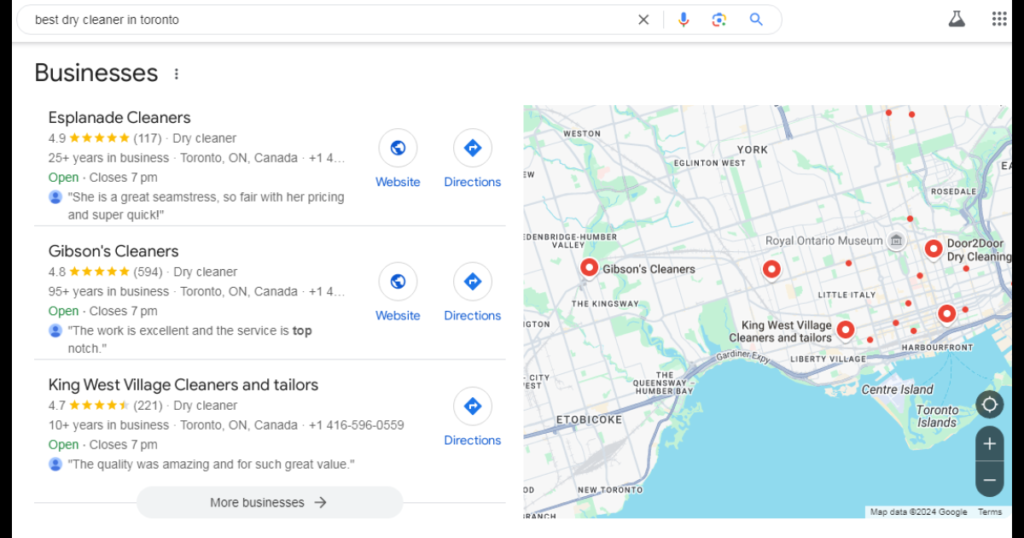
When you search for something locally, like “best pizza near me,” Google uses your location to show you relevant businesses.
Here are some ways to improve your local SEO:
- Claim and optimize your Google Business Profile: This is like your online storefront. Make sure your information is up-to-date and accurate.
- Find relevant keywords: Use keywords that people in your area are searching for, such as “plumber in Chicago” or “hairdresser in Miami.”
- Create local content: Write blog posts or articles about local events, news, or tips.
- List your business in local directories, including platforms like Yelp, TripAdvisor, and local business directories.
- Encourage customer reviews: Positive reviews can boost your local SEO.
Did you know that 88% of people who search on their phones visit a related business within a week? That’s why local SEO is crucial.
Tools like Ubersuggest’s Listing Management and Keyword Overview can help you improve your local SEO. For example, Morningside Acupuncture in New York increased its organic traffic from 1,000 to 20,000 to 30,000 monthly visitors by optimizing its local listings and targeting local keywords.
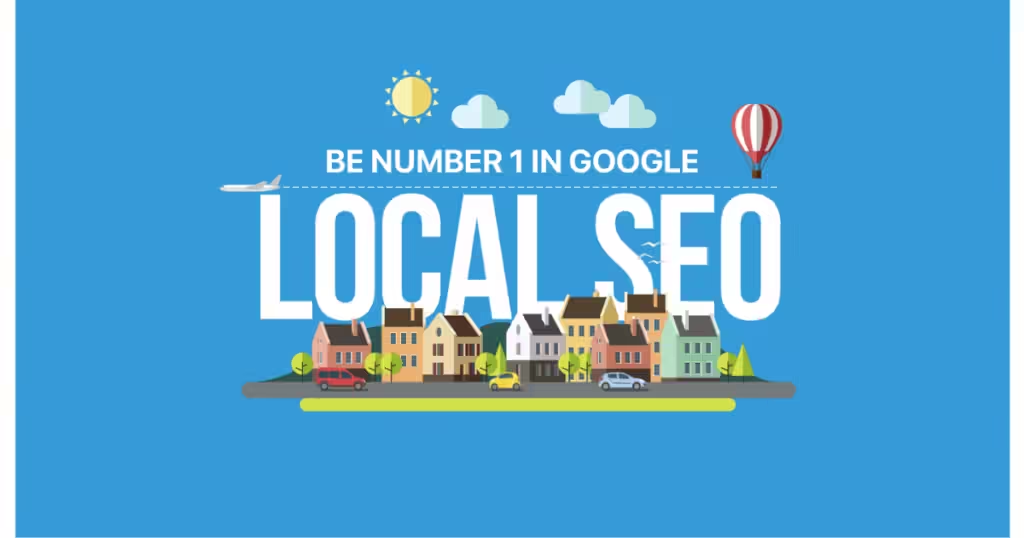
8. SEO Helps You Outshine Your Competitors
Investing in SEO helps you stay ahead of the competition. Your competitors are likely optimizing their websites to rank for industry keywords, which means they’re attracting potential customers who could be yours.
With the right tools, you can analyze your competitors’ SEO strategies and identify opportunities to surpass them.
By using Ubersuggest, you can:
- Identify your main competitors
- Understand how customers find them
- Discover the keywords they target
This information can help you learn from your competitor’s strengths and weaknesses.
For instance, Pastreez, a French bakery, used competitive research to assess the competition in the macaron market. By using Ubersuggest’s Keyword Overview tool, they identified who was ranking for the term “macarons near me.”
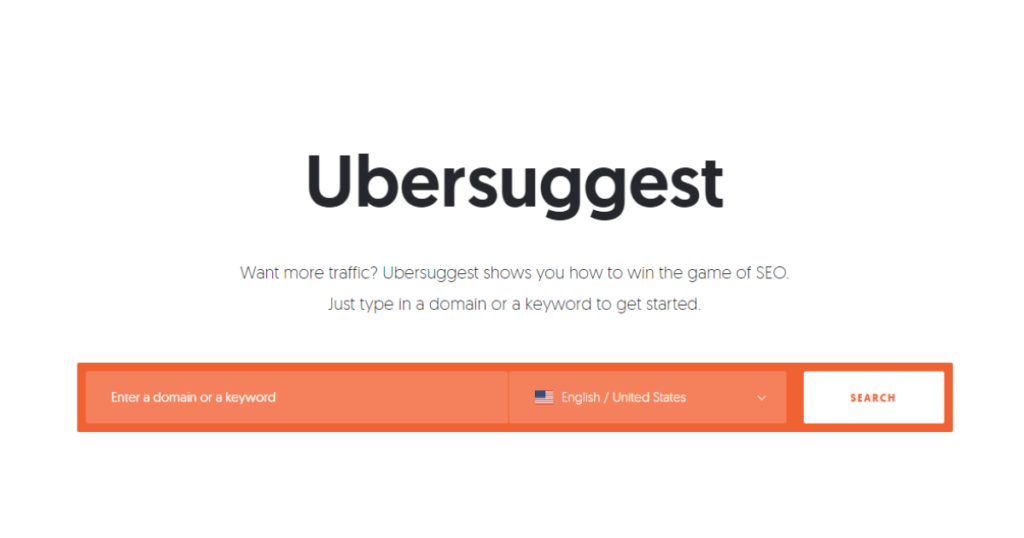
They then analyzed each competitor’s website to identify other relevant keywords they were ranking for. This information was used to create new pages on their website that were optimized for SEO and loaded faster.
As a result, Pastreez now ranks highly in local search results.
To find out what’s working for your competitors, enter their domain into Ubersuggest’s Organic Research tool, select your target country, and click “Search.”
The “Competitors” report will provide a summary of each competitor’s traffic, keywords, and estimated advertising costs.
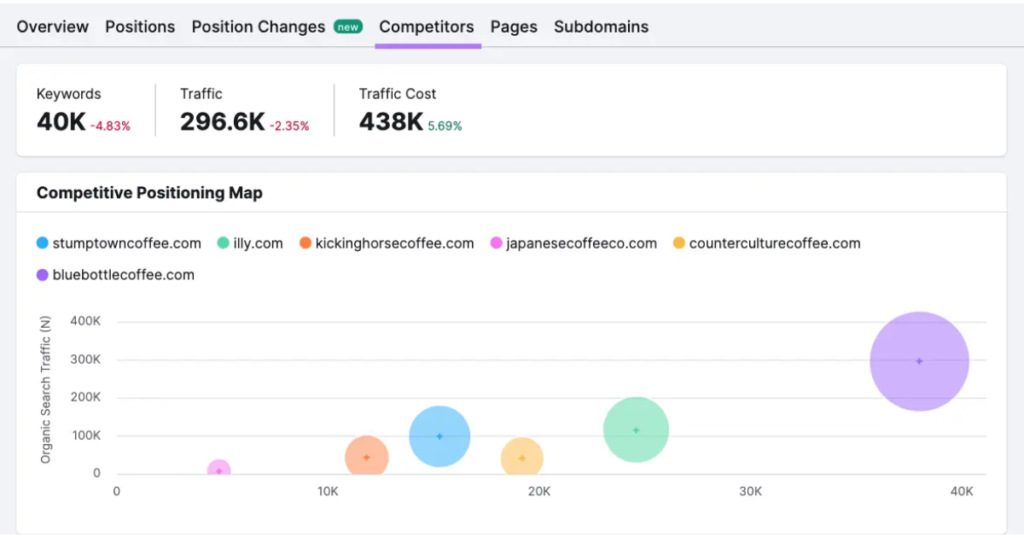

Click “View…” next to any report to go into further detail.
Study your competitors to learn how websites like yours attract visitors and use the information to create a more effective strategy.
Further reading: What Is a Competitor Analysis & How to Do It (with Template)
9. SEO Boosts Your Overall Digital Marketing
SEO can enhance your overall digital marketing performance. For example, a well-designed website can improve user experience, leading to increased sales. High-quality content can attract visitors from various channels, including social media, email, and paid advertising.
Reputation’s “Ultimate Guide to Customer Review Management” is a great example. This in-depth guide ranks highly on Google for the keyword “customer review management guide,” attracting organic traffic to their website.
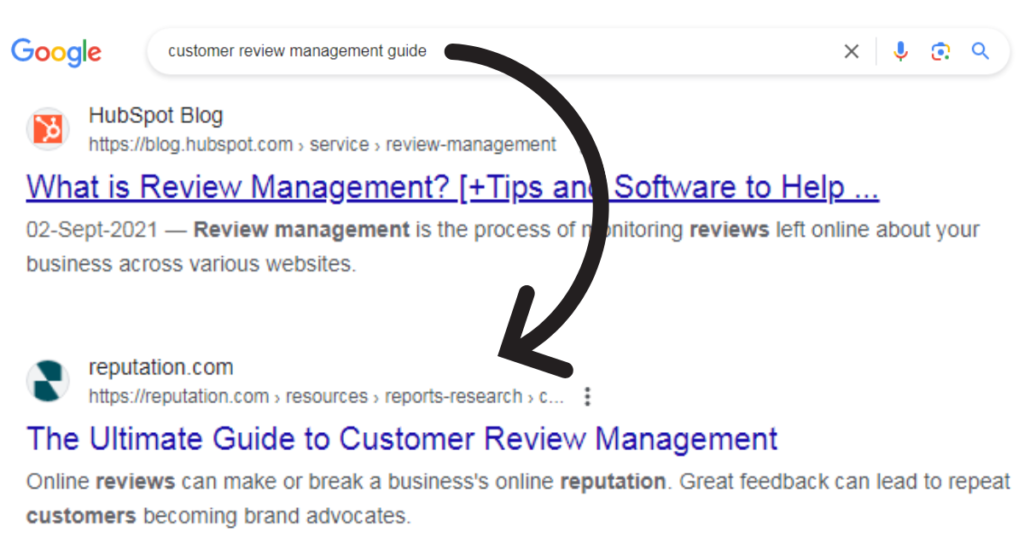
This high ranking means it could be a great asset for a pay-per-click (PPC) ad campaign.
Reputation uses LinkedIn ads to drive traffic to the report landing page and get more eyes on its content.
Tools like Ubersuggest and Google Analytics provide valuable data on your target audience, including:
- Age
- Gender
- Income
- Location
- Interests
- Popular keywords
- Frequently asked questions
You can leverage this information to refine your digital marketing strategy and reach the right people. For instance, you can create blog posts or videos addressing common questions or target specific demographics with tailored email campaigns.
To quickly analyze your audience, input your website URL into Ubersuggest’s One2Target tool. The “Demographics” tab will provide a detailed breakdown of your website visitors based on age, gender, and location.
Reap the Benefits of SEO Today
SEO takes time and consistent effort, but it can significantly boost your website traffic and customer acquisition.
To start your SEO journey, check out our Ultimate Guide to SEO for Beginners. This guide will teach you how to identify relevant keywords and create content that matches search intent.
Ready to dive deeper? Sign up for a free Ubersuggest account to access powerful keyword research tools, competitor analysis reports, and more.

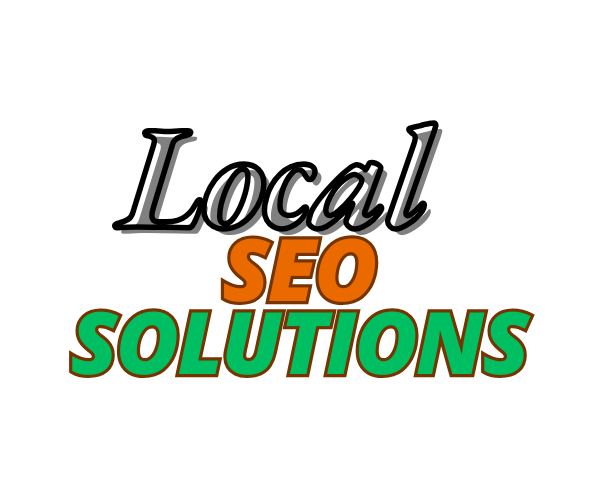
Pingback: What Is SEO ? - Local Solutions